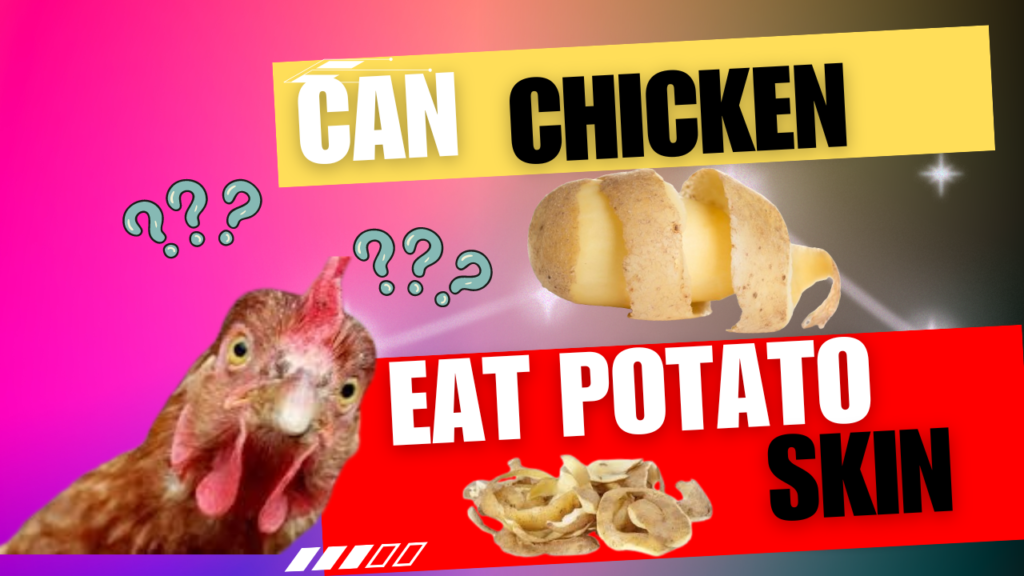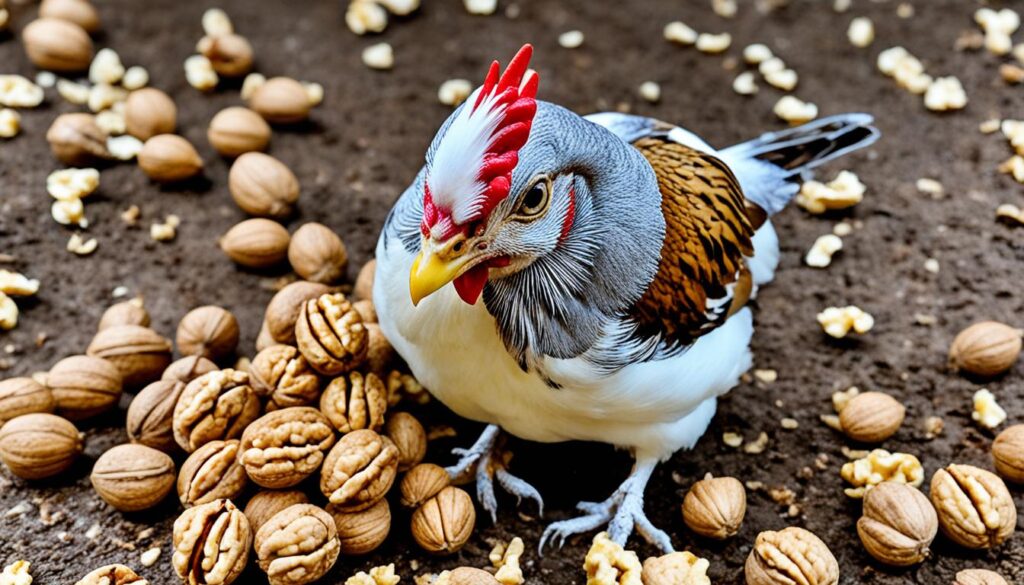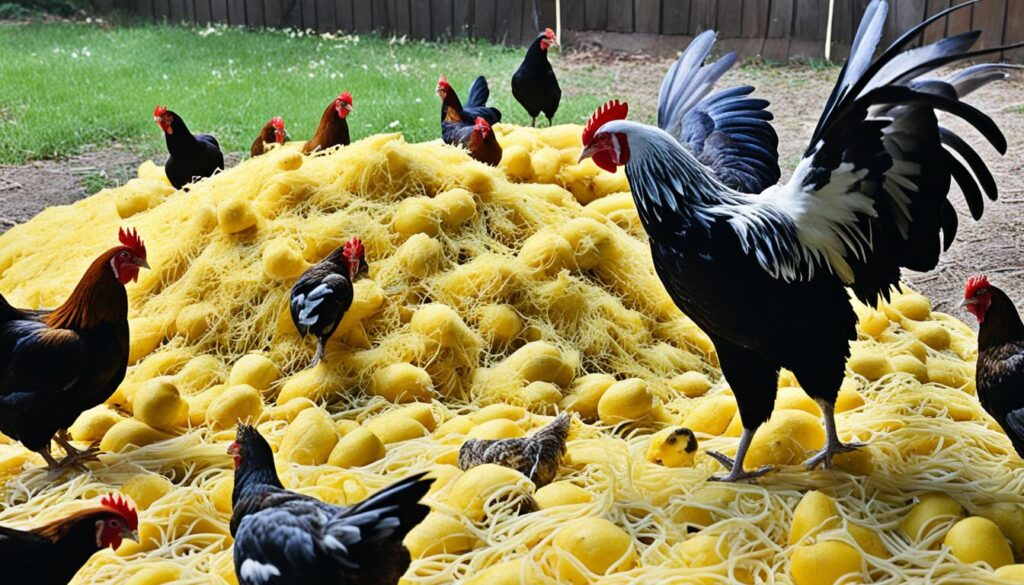1-Introduction: Can Chicken Eat Potato Skins?
Attention chicken owners and enthusiasts! Are you curious about what types of foods are safe to feed your feathered friends? Well, today we’re going to dive into a popular question: can chickens eat potato skins?
Chickens have unique nutritional needs, and it’s important to provide them with a balanced diet. In this article, we’ll explore whether or not potato skins are suitable for our clucking companions. So grab a seat, gather ’round the coop, and let’s find out if those leftover spud peels can be a tasty treat for your flock!
2-What are the Nutritional Needs of Chickens
Yes , Chickens can eat potato skin , but Before we can determine if potato skins are safe for chickens to eat, let’s first understand the nutritional needs of our feathered friends. Chickens, just like any living creature, have specific nutritional needs to thrive and maintain optimal health. As omnivores, they require a balanced diet that includes a combination of protein, carbohydrates, fats, vitamins, and minerals.
Protein is a crucial component of a chicken’s diet as it helps support muscle growth and repair. Good sources of protein for chickens include insects, worms, and high-quality feeds containing soybean or fishmeal.
Vitamins are important for chickens’ overall health and immune system. Vitamins A, D, E, and K are all essential for chickens, and they can be found in leafy greens, fruits, and vegetables. also vital for maintaining optimal health in chickens. Vitamin A promotes good vision and immunity while B vitamins aid in energy metabolism. Leafy greens such as spinach or kale are excellent sources of vitamins for your feathered friends.
Minerals should not be overlooked either! Calcium is especially important for egg-laying hens as it ensures the development of strong eggshells. Crushed oyster shells or calcium supplements can be provided alongside their regular feed.
Don’t forget about Carbohydrates! While too many carbs can lead to weight gain, they still play an essential role in providing energy to our clucking companions. Grains like corn or wheat can be included in their diet but should be given in moderation.
Remember, meeting your chickens’ nutritional needs will help keep them healthy, happy, and laying delicious eggs! Now, let’s get back to the question at hand – Can Chickens Eat Potato Skins? So let’s explore whether potato skins can contribute positively to their dietary requirements!
3-Can Chicken Eat Potato Skins ?
Chickens are known for their ability to eat a wide variety of foods, but when it comes to potato skins, there are some things you should consider. Now, let’s address the question: Can chickens eat potato skin? The answer is Yes, with some important considerations. Potato skins can be a good source of nutrients for chickens, as they contain vitamins and minerals like potassium and vitamin C. However, there are also potential risks associated with feeding chickens potato skins.
Firstly, potato skins should only be fed to chickens in moderation. While they can provide some nutritional benefits, they are also high in carbohydrates and can contribute to weight gain if given too often. As mentioned earlier, a balanced diet is crucial for chickens, so it’s important to limit the amount of potato skins they consume.
A good rule of thumb is to treat potato skins as a special treat rather than a regular part of their diet. This will help ensure they are getting all the necessary nutrients from their regular feed.
One of the main concerns is that potato skins can be difficult for chickens to digest properly. The tough texture and high fiber content can make it challenging for them to break down the skin in their digestive system. This could lead to blockages or other digestive issues if too much potato skin is consumed.
In addition, it’s important to note that potatoes themselves should always be cooked before feeding them to chickens. Raw potatoes contain anti-nutritional factors that can interfere with nutrient absorption and digestion.
While small amounts of cooked potato skin may not pose significant risks to your feathered friends, it’s best to err on the side of caution and only offer this treat occasionally as part of a balanced diet alongside other safe foods for chickens.
4-Pros & Cons of Eating Potato Skin
When it comes to feeding chickens, many people wonder if they can eat potato skins. Well, the answer is yes! Chickens can indeed consume potato skins, but as with any food, there are pros and cons to consider.
One of the main advantages of feeding your chickens potato skins is that they provide a good source of nutrients. Potato skins contain vitamins such as vitamin C and B-complex vitamins, which are essential for their overall health and development. Additionally, potato skins also contain minerals like potassium and iron.
Another benefit of feeding your flock potato skins is that it helps reduce waste. Instead of throwing away the peelings after cooking potatoes for yourself or your family, you can simply give them to your chickens as a tasty treat.
However, there are also some potential drawbacks to consider when it comes to feeding chickens potato skin.
Potatoes contain Solanine, a poison found in their outer layers, skin and stems, as well as leaves and stems. The levels of solanine rise dramatically when they are exposed to the sun. It is evident that the potato skin should not be eaten after being left in the sunlight for some time.
Another potential downside is that potato skins are high in carbohydrates and can contribute to weight gain if given too often. As mentioned earlier, a balanced diet is crucial for chickens, so it’s important to limit the amount of potato skins they consume.
It’s important to note that moderation is key when offering potato skins or any treats for that matter. Too much of anything can upset their delicate digestive system or lead them towards nutritional deficiencies from not eating what they need most—complete feed pellets designed specifically for poultry nutrition.
In conclusion,
while chicken owners may choose to offer their feathered friends small amounts of cooked (and cooled) plain potatoes including peels occasionally as part of a varied diet plan—not exceeding 10%—it’s ultimately crucial to always prioritize balanced nutrition by providing them with high-quality complete feed formulated specifically for optimal chicken health.
5-Risks of Feeding Chickens Improper Foods
Feeding chickens improper foods can have detrimental effects on their health and well-being. While it may be tempting to give them scraps or leftovers from your meals, it’s important to remember that chickens have specific dietary needs.
One of the risks of feeding chickens improper foods is nutrient deficiencies. Chickens require a balanced diet that includes protein, carbohydrates, fats, vitamins, and minerals. Feeding them foods high in one nutrient but lacking in others can lead to imbalances and deficiencies.
Another risk is digestive issues. Chickens have a unique digestive system designed for processing certain types of food. Feeding them foods that are difficult for them to digest can cause stomach upset, diarrhea, or even blockages in their digestive tract.
Feeding chickens spoiled or moldy food is also risky. Consuming these types of foods can lead to bacterial infections or toxin poisoning which can be fatal for your feathered friends.
Additionally, some human food items might contain harmful substances such as spices or additives that could be toxic to chickens if ingested in large quantities.
To keep your flock healthy and happy, it’s best to stick with a balanced chicken feed specifically formulated for their nutritional needs. If you want to treat them occasionally with kitchen scraps or garden produce make sure they are safe and appropriate by doing thorough research beforehand.
6-Other Foods That Chickens Can and Cannot Eat
When it comes to feeding your chickens, it’s important to know what they can and cannot eat. While potato skins may not be the best choice for their diet, there are plenty of other foods that chickens can enjoy.
Some of the foods that chickens can eat include:
1. Fruits: Chickens love fruits like apples, berries, melons, and grapes. These provide them with vitamins and antioxidants.
2. Vegetables: Leafy greens like spinach and kale are great for chickens’ health. They also enjoy carrots, broccoli, and cucumbers.
3. Grains: Chickens need grains in their diet for energy. You can feed them corn, wheat, oats, or even cooked rice.
4. Protein-rich foods: Chicken mealworms or insects are excellent sources of protein for your flock.
On the other hand, certain foods should be avoided when feeding chickens:
1. Avocado: The skin and pit of avocados contain a toxin called persin which is harmful to chickens.
2. Chocolate: Just like dogs, chocolate is toxic to chickens due to its theobromine content.
3. Onions and garlic: These vegetables contain compounds that can damage a chicken’s red blood cells if consumed in large quantities.
Remember to always offer a balanced diet consisting mainly of specially formulated chicken feed along with some treats from time to time as part of
7-Conclusion: Keeping Your Feathered Friends Healthy and Happy with a Balanced Diet
Conclusion: Keeping Your Feathered Friends Healthy and Happy with a Balanced Diet
It is important to provide chickens with a balanced diet that meets their nutritional needs. While potato skins may be safe for chickens to eat in small quantities, there are both pros and cons to consider. The high fiber content and potential for added nutrients make potato skins an attractive option for some chicken owners. However, the presence of solanine can pose risks if consumed in large amounts.
To ensure the well-being of your feathered friends, it is essential to avoid feeding them improper foods that could be harmful or toxic. This includes uncooked potatoes or green potatoes containing solanine. Additionally, remember that while treats like potato skins can be given occasionally as part of a varied diet, they should not replace the main sources of nutrition such as grains, vegetables, fruits, and specially formulated feeds.
When introducing new foods into your chickens’ diets or considering alternative options like potato skins, always do so gradually and monitor their response closely. If you notice any signs of digestive upset or adverse reactions after offering certain foods including potato skins, consult with a veterinarian who specializes in poultry health.
Remember that providing your chickens with appropriate nutrition goes beyond just what they can and cannot eat – it also involves ensuring access to clean water at all times and maintaining proper housing conditions.
By staying informed about the nutritional requirements of your flock and making educated choices about their diet, you can help keep your feathered companions healthy and happy for years to come. So go ahead – give them tasty treats within moderation but always prioritize balance when it comes to feeding your beloved chickens!




